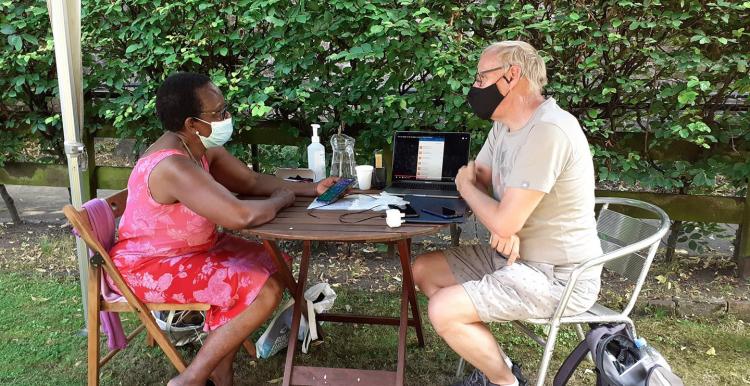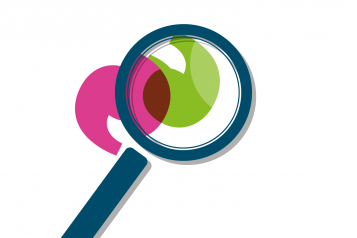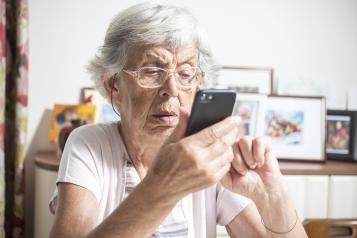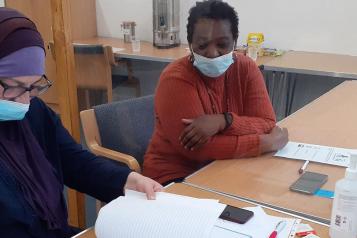Healthwatch helps to drive forward a new borough-wide strategy to promote digital inclusion

Digital Champion and learner outside at Manor Gardens as we began offering face-to-face support sessions again last month.
Our background as a provider of digital support
Research we carried out with our Diverse Communities Health Voice partners back in 2016 told us that residents wanted to learn about safe internet use to be able to self-care. To meet this need we started to deliver digital support programmes with those partners. Over time we also began to recruit volunteer Digital Champions to offer one to one support for individuals.
Over 700 residents supported
- Together we have supported over 700 local people, primarily from ethnic minority backgrounds and often living with complex health conditions to feel confident to use the internet safely and to feel more connected to others.
- Participants have used the learning to improve their well-being by setting up step-counting groups, connecting with grandchildren online, getting the news in their mother tongue, and participating in faith-based activities online.
- Participants have been able to take charge of their own health by using the internet to look up condition-specific concerns, book GP appointments online, find local wellbeing activities, and access virtual talking therapy.
- Our report launch gave us the opportunity to share what we have learned about what works.
Launch event for our report on digital exclusion
Our report 'From Digital Exclusion to Inclusion' recommended a series of actions to make the borough more digitally inclusive.
National and local perspectives
The report launch took place on 14 July and was well attended by a wide range of organisations:
- We were already massive fans of the national social change charity Good Things Foundation when they first got in touch with us (they really liked the safeguarding processes we'd put in place to protect our volunteer Digital Champions). They spoke about the work they did nationally to promote digital inclusion.
- The private sector was also represented. IT infrastructure provider KCOM gave some examples of how they had supported inclusion, for example removing caps on data and working with schools and hospitals to provide devices during the pandemic.
- We heard from local voluntary sector organisations and social enterprises about work going on within the borough, and from digital champions and learners about the experience of giving and getting digital support. Islington Council was well represented as were North Central London Clinical Commissioning Group. We also welcomed many local residents who were interested in this issue.
Discussion topics were explored in break-out sessions:
- How has the private sector been working towards digital inclusion?
- How can statutory and voluntary sector partners work together to make the borough digitally inclusive?
- What do providers such as the NHS need to do to make their digital platforms easier to use?
We need to learn from the perspective of non-digital users, not just design for digital natives
Our impact
- Because we've helped to highlight the impact of digital exclusion on health inequalities, and because these impacts have been felt very deeply during the pandemic, we're happy to say that London Borough of Islington has agreed to review its digital strategy.
- Healthwatch has also been invited to sit on the steering group that will lead on co-producing a new digital inclusion strategy for the borough. We would like to thank our partners, funders, and volunteers for all their work on this so far.
Why digital inclusion is a priority for Healthwatch Islington
We know that there is a huge digital divide in Islington. This digital poverty affects those experiencing other forms of disadvantage and exacerbates health inequality. Access to digital can help us save money on essentials including fuel and food, can help us keep connected with others, and is an essential tool for employment and education.
The government’s Digital First Primary Care strategy has been accelerated by the pandemic and we want to help ensure that this does not make existing health inequality worse. Patients also have the right to receive NHS services free of charge. We are worried that this key principle of the NHS is impacted by the costs associated with internet access for those who are economically worse-off.


